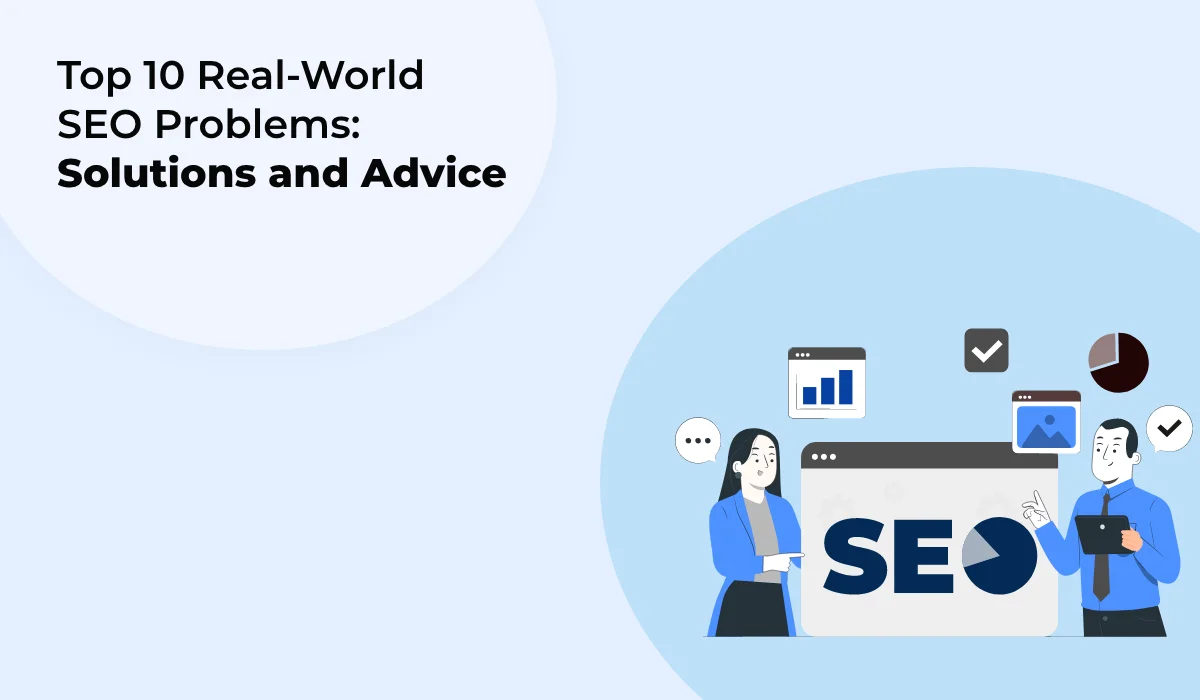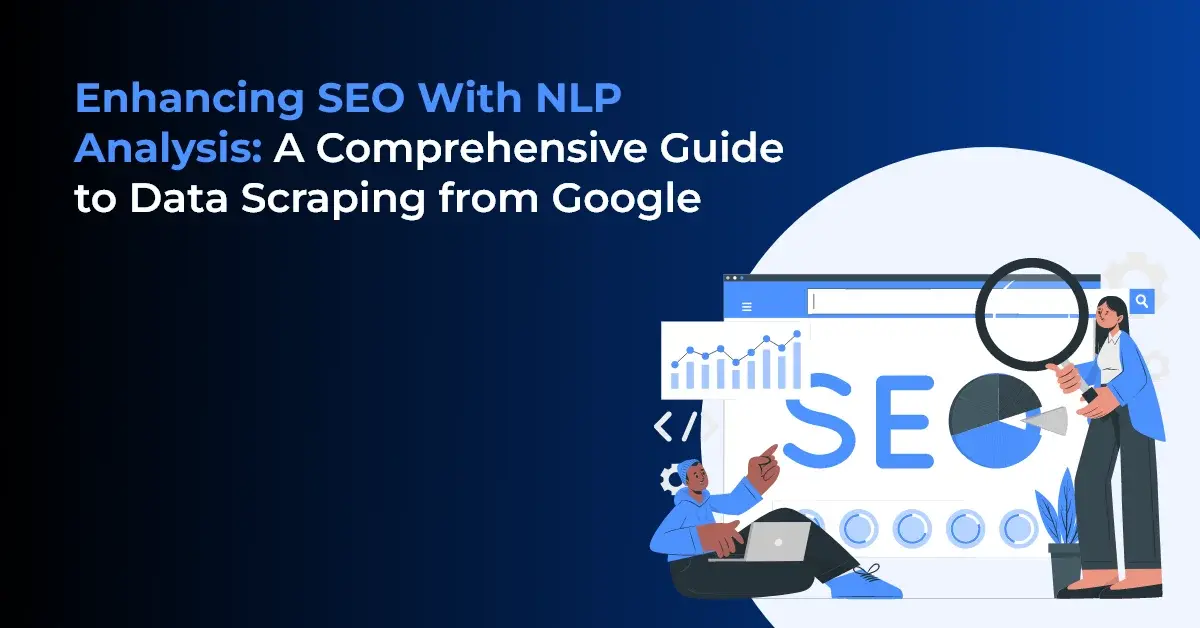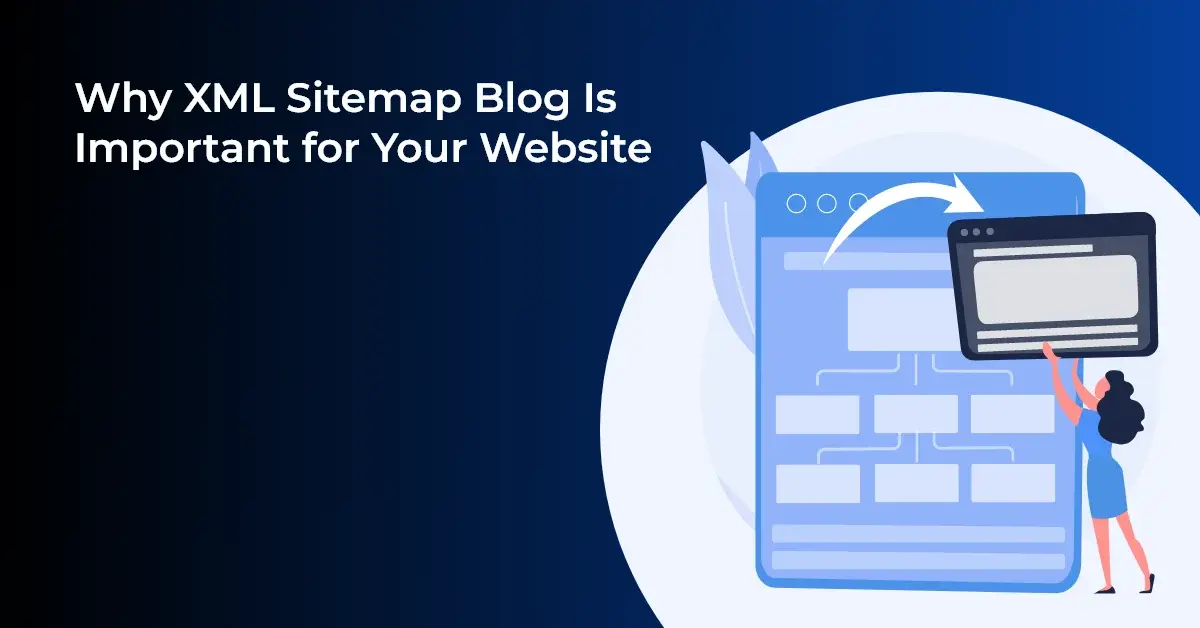Real Estate SEO Tips: Boost Your Online Visibility & Leads

Published on: August 6, 2021
Updated on: March 17, 2025
2012 Views
- SEO (Search Engine Optimization)
21 min read
To pull in the maximum number of leads from your industry, your real estate business needs to be prepped with the right real estate SEO. This is to ensure your target audience successfully finds your business first instead of coming across your competitors.
According to the National Association of Realtors, around 43% of buyers looked online for properties as their first step. After conducting appropriate searches, buyers are more likely to open sites that appear at the top. It is the competition for the top search spots that makes real estate SEO so important.
Without further ado, let’s move on to how real estate SEO helps improve your online presence.
Read on the 7 tips that will get you started on your real estate SEO campaign.
1. Prioritize Keywords
When it comes to choosing your keywords, make sure you have done your share of research. Knowing the right keywords is essential as not every keyword will be beneficial for real estate SEO. After determining the keywords, you can take the appropriate steps to attract your target audience.
Utilize Google’s Keyword Planner to identify the frequently used keywords. It will also display how many of your competitors are working to gain the top rankings. Use only the relevant keywords associated with your web page; beware of keyword stuffing that can hurt your site ranking.
How to use the keywords?
You should use the keywords throughout your content, but mainly and without fail in title tags, headers, and the article body. Simply put, the keywords should be placed naturally where readers would usually look. If readers are satisfied with what is delivered to them, it will improve your real estate SEO.
Here are some of the keyword areas where you need to indulge to ensure better SEO:
- Generic competitive terms
- Niche terms
- Branded terms
2. Social Media
Social media might not be the ideal place to improve your real estate SEO but it is one of the best and highly beneficial platforms when it comes to connecting to your audience and establishing an online presence. Thus, real estate businesses must have a social media profile.
You can use social media platforms to build trust and awareness among your target audience as high traffic runs through these platforms. As they come across your post while scrolling, it is easy to guide them toward your website and convert them into customers. Not only does social media allow you to better connect with your audience but it also increases the exposure of your web page.
Use platforms according to their specialty content genres. Social media platforms like Instagram are best for promoting visual content. Facebook, on the other hand, is good at showcasing the best sales opportunities.
Focusing on the right platforms instead of all social media platforms ensures the content quality isn’t stretched out. You can also make use of hashtags and geo-targeted keywords in social media to group your content better for the target audience.
3. High-Quality Content
For real estate SEO to take off, the content displayed on your website should be of quality and be original. This is a basic rule not only for real estate but also for any other business looking to improve its SEO.
Do not restrict yourself to providing text-only content as it tends to bore users very fast. Include other mediums like images or video to captivate your readers better. Having high-quality content helps in reducing the bounce rates of the web page.
Many real estate websites use overused generic content without realizing its negative impacts on real estate SEO. Saturated content hurts your ranking as google ranks unique content better than copied content.
Here are some tips for authentic real estate content:
- Provide unique descriptions for each property
- Provide detailed company overview
- Display company updates
- Offer reports and research on the industry
- Provide associated news articles
- Display recent company transactions
4. Optimizing Images
Integrating the best real estate SEO is not enough as it places you among search results that heavily rely on images. Ranking your web page among top results will not be enough as competitors that use images will still have a better edge. Images give potential customers a better idea about the topic in question than text descriptions.
Since search engine algorithms are not optimized for images, they will not process them to rank your webpage. Then, how do images work? It’s the image details that the algorithm considers to better rank your web page.
Consider these image factors to utilize your images for better web page performance:
- Filename - Google search algorithm cannot process images. Hence, it takes into consideration the name of the image file to analyze it.
- File format - There are many options for file formats but PNG and JPEG are highly recommended. Formats that require less size won’t drag the overall site performance down.
- Alternative text - Under unprecedented circumstances, images might not load and in its place can be text that describes the image.
5. Writing Blogs
Writing blog posts is a good way to earn backlinks that can direct the traffic back to your web page. Using blogs eliminates the need to be completely dependent on real estate SEO. Blogs can help readers be up to date with the new listings.
Include new properties which might interest readers and convert them into your potential clients. Blogs provide more opportunities for pursuing your chosen keywords. You can blog about the cost of living and facilities available with the properties.
Note: Keep your blog posts short and direct to make them understandable to a wider audience. Utilize white spaces by limiting the paragraphs to 3 sentences. Lastly, make sure the blogs are in readable fonts at suitable font sizes.
6. SSL Certification
Gaining SSL certification is another way to enhance your real estate SEO. SSL provides better security to your clients by encrypting visitor information. It helps in ensuring the visitor information is only available to the server and not any third party.
Security is highly important as when users enter banking details, their information is at the risk of being targeted by hackers. Even if the web page does not contain eCommerce elements, acquiring SSL certification is an industry standard. Just make sure the certification is obtained from trusted vendors.
Earn organic reviews from popular platforms like Google and Yelp. Reviews help improve brand image and further your online presence. Good reviews are more likely to gather clicks for your web page.
7. Reviews and Citations
Do not resort to artificial or paid reviews as they can do more harm than good to your website rankings. Obtaining reviews is a simple process, which mainly requires asking the client about their experience. Adding a review section is an effective way to garner reviews or you can send an email to the customer with a link to the desired review source so that they can share their opinion.
Citations are another factor that can be used to improve ranking in local search results. Google uses business citations for ranking factors for the local search terms. Any listing of your business on the internet is a local citation.
Google often uses multiple citation sources to provide useful information to users searching for your business. Real estate directories are one of the best citation sources for the real estate industry. Directory citations can be considered as an alternative channel to gather new clients.
Fully complete citations come with your brand name, location, and contact number. Citations usually come without backlinks that can lead them back to the website. Citations with backlinks are even better as they further enhance your backlink profile.
Harnessing On-Page SEO for Real Estate Websites
At the heart of a successful real estate website lies a robust on-page SEO strategy. By fine-tuning the various on-page elements, your property listings can climb the search rankings, ensuring maximum visibility to potential clients. Below, we explore key tactics to optimize your real estate webpages effectively.
Optimization of Title Tags and Meta Descriptions for Property Pages
First impressions count, and in the world of SEO, your title tags and meta descriptions are the equivalent of a welcoming handshake. To catch the eye of both search engines and potential buyers, make sure your title tags accurately reflect the content of your page while including relevant keywords. Likewise, craft compelling meta descriptions that act as a preview, enticing users to click through to your listings.
Using Header Tags to Structure Content for Engine Crawlers
Search engine crawlers thrive on structure, and header tags are the scaffolding of your content's architecture. By using <H2> and <H3> tags, you not only improve readability for your visitors but also help search engines understand the hierarchy and relevance of your content, making your property pages more likely to be featured prominently in search results.
Enhancing Images with Alt Tags for SEO Benefits
An image might be worth a thousand words, but without appropriate alt tags, search engines are left in the dark. Use descriptive alt tags filled with relevant keywords for every image of your properties, allowing search engine bots to index them properly. This not only boosts your overall SEO score but also improves the likelihood of appearing in image search results, drawing more eyes to your listings.
- Title Tags: Keep them concise, relevant, and keyword-rich.
- Meta Descriptions: Craft them to be captivating and reflect the content of the page.
- Header Tags: Organize your content hierarchically with H2 and H3 tags.
- Image Alt Tags: Provide descriptive, keyword-focused text for each image.
Local SEO Strategies Tailored for Real Estate Agents
As a real estate agent, standing out in the local market is crucial to attracting prospective buyers and sellers. By leveraging local SEO, you can increase your visibility where it really matters – in your community. Let's explore some of the most effective local SEO strategies you can use.
Leveraging Google My Business for Enhanced Local Presence
Creating and optimizing your Google My Business (GMB) profile is a game-changer for local SEO. This free listing makes your real estate business more discoverable on Google Maps and Search, providing potential clients with key information at a glance. Make sure to:
- Complete every section of your profile, including contact details and business hours.
- Encourage satisfied clients to leave positive reviews.
- Post regularly to showcase recent properties, open houses, and real estate advice.
Importance of NAP Consistency Across Online Listings
NAP consistency, referring to your business's Name, Address, and Phone number, is essential for local SEO. Inaccurate or inconsistent listings across online directories can hinder your search engine rankings. Ensure that your NAP information is uniform on all platforms, from social media to local business directories.
Crafting Local Content that Resonates with the Community
Creating content that speaks to your local market is another effective way to boost your local SEO. This includes:
- Writing blog posts about local market trends.
- Featuring neighborhood guides and reviews.
- Highlighting local events or community projects you are involved with.
Engaging with your community through relevant content not only positions you as a local expert but also attracts potential clients searching for real estate advice in your area.
Crafting Compelling Content for Property Listings
In the competitive realm of real estate, your property listings are the frontline of your sales effort. They aren’t just advertisements—they’re the opening chapter of a potential buyer’s story with their new home. Let’s dive into how you can make these listings not just informative, but utterly irresistible.
Storytelling in Property Descriptions to Engage Prospective Buyers
Everyone loves a good story, and this is exactly what your property descriptions should tell. A well-crafted story will transport the reader, allowing them to envision their life unfolding within the walls of the listed property. So, paint a picture of cozy winter evenings by the fireplace or the laughter of friends echoing in the spacious backyard during summer barbecues. Remember, you're not just selling a space; you're selling a dream.
Blogging on Real Estate Topics to Boost Website Traffic
Running a blog on your website isn’t just about sharing your insights on real estate—it’s a robust tool to increase visibility and drive traffic. With each blog post, you’re creating another opportunity for search engines to find you. Cover topics from home improvement tips to neighborhood guides or market trend analyses, and provide value to both your current and potential clients to keep them coming back for more.
The Value of FAQ Pages for Answering Buyer Queries
- Address common concerns: An FAQ page is your chance to address the common questions that can be barriers to engagement.
- Build trust: When buyers find answers easily, they see your site as a resource, building trust in your expertise and services.
- Keyword integration: Use questions that include your targeted keywords to improve the SEO of your FAQ page.
Mobile Optimization: The Key to Modern Real Estate Search
As smartphones become increasingly integral to everyday life, mobile optimization has emerged as an essential facet of Real Estate SEO. It's not just about being seen; it's about providing a seamless, user-friendly experience that aligns with the modern homebuyer's lifestyle. Let's dive into why mobile-friendly websites are now a cornerstone of real estate search visibility.
Analyzing The Impact of Mobile-Friendly Websites on User Experience
Today's real estate clients are on the move, and their mobile devices are their lifelines to the world of property listings. A mobile-friendly website not only ensures that potential clients can access your listings at their convenience, but it also positively impacts search rankings. Google emphasizes user experience, and sites that cater to mobile users rank better on search engine results pages.
Implementing Responsive Design for Optimal Display Across Devices
Responsive design is the answer to a smooth experience on any device. It automatically adjusts web content to fit the screen size of smartphones, tablets, and desktops, ensuring your site looks pristine and is easy to navigate regardless of how your clients find you. When it comes to real estate, where visuals are everything, a responsive design can make or break a client's decision to engage with your property listings.
Accelerated Mobile Pages (AMP) for Faster Loading Times
Speed is a non-negotiable in the current digital landscape. Accelerated Mobile Pages (AMP) strip down the code to provide faster loading times for your content. For busy home seekers, a speedy, efficient site can be the deciding factor in choosing your realty services over a competitor's. Embrace AMP and give your clients the efficiency they demand in their property search.
- Increased engagement and lower bounce rates due to swift page loads
- Improved search rankings as speed is a key Google ranking factor
- Better user experience leading to higher client satisfaction
In a market as dynamic and competitive as real estate, embracing mobile optimization is not an option—it's a critical necessity. By focusing on mobile-friendly designs and AMP, you'll cater to the modern searcher's needs and ensure that your real estate listings have the visibility they deserve.
Building High-Quality Links to Boost Real Estate Websites
When it comes to Real Estate SEO for Visibility, the power of building high-quality links cannot be overstated. It’s not just about having a multitude of links pointing to your website; it's the quality that truly makes the difference. High-caliber backlinks act as votes of confidence from other reputable sites, which search engines use as indicators of your site's credibility and relevance in the real estate industry.
The Significance of Quality over Quantity in Link Building
In the realm of link building, real estate professionals should focus on quality over quantity. Rather than scrambling to acquire as many links as possible, the goal is to attract high-quality backlinks from sites with established authority and relevance to the real estate market. These valuable links can significantly improve your website's search ranking and drive targeted traffic to your listings.
Strategies for Gaining Backlinks from Reputable Real Estate Portals
- Reach out to well-known real estate portals and offer compelling reasons why linking to your website would benefit their audience.
- Provide high-value resources or market analyses that real estate portals would consider link-worthy.
- Engage in community discussions on these platforms and share insights that lead back to your content.
Guest Blogging on Real Estate Topics to Enhance Credibility and Visibility
Guest blogging is an excellent way to establish yourself as a thought leader in the real estate sector. By contributing valuable content on real estate topics to authoritative blogs, not only do you gain exposure to their audience but you also create the opportunity for quality backlinks to your site. Carefully select the topics that resonate with both the blog’s audience and your desired clientele to maximize efficacy.
The Power of Video Marketing and Virtual Tours
In today's digital world, video content and virtual tours have become indispensable tools in the real estate market. Not only do they provide an immersive experience for potential buyers, but they also significantly enhance your Real Estate SEO efforts, ensuring your properties get the visibility they deserve.
The Role of Video Content in Real Estate SEO Strategy
Video content is a powerful medium capable of captivating audiences and boosting engagement on your real estate website. It's an excellent way to showcase properties, build trust with your audience, and keep them on your site longer, which can positively affect your site's search engine rankings.
Creating Engaging Virtual Tours to Amplify Property Attractiveness
Virtual tours take property presentations to the next level by providing a virtual walk-through experience. This allows potential buyers to get a realistic feel for the space, layout, and ambiance of a property without physically being there, increasing the likelihood of them taking the next step in the purchasing process.
Best Practices for Video SEO in Real Estate
- Optimize video titles and descriptions with targeted keywords to help them rank better in search results and attract the right audience.
- Host videos on your own domain before uploading them to any video sharing platforms to ensure that your website gets the traffic and recognition it deserves.
- Create a video sitemap and submit it to search engines to ensure all your video content is indexed and therefore more likely to appear in searches.
- Encourage shares and backlinks by creating high-quality, informative, and engaging videos, thus increasing your site's authority and rankings.
- Use social media to promote your videos and virtual tours to reach a broader audience and drive more traffic to your website.
Boost Your Online Property Showcase: Speed is Key!
Welcome to the fast lane of Real Estate SEO! You know the importance of visibility in the real estate market, but how often do you consider the impact of your website's speed on user experience? The truth is, no matter how gorgeous your listings are, if your site is slow, potential buyers may never stick around to admire them. In this section, we'll delve into why site speed is critical and how you can optimize it for a smoother, speedier user journey.
Why Site Speed Makes or Breaks Real Estate Deals Online
Did you know that there's a strong statistical correlation between site speed and user satisfaction? Every extra second your website takes to load can significantly increase the bounce rate. For real estate, where first impressions are everything, a slow site can mean the difference between a sale and a swift exit.
Tools to Get You Ahead in the Digital Property Race
It's time to take action, but where do you begin? Start by utilizing tools like Google's PageSpeed Insights to measure your real estate website's performance. These tools provide valuable insights and actionable recommendations that can help you make data-driven decisions to improve your loading times.
Prioritizing Speed for SEO and User Delight
Google loves speed, and so do users. That’s why fast loading times are essential for better rankings and user retention. Optimizing images, minifying CSS and JavaScript, leveraging browser caching, and utilizing a reliable hosting service are just a few strategies that can significantly slash those load times. By doing so, you not only enhance the user experience but also send positive signals to search engines, making your site a real estate hotspot!
- Consider optimizing your images for faster loading without compromising quality.
- Implement caching to reduce server load and speed up page delivery.
- Minimize unnecessary code and reduce redirects to streamline the user's journey.
Today's real estate market is incredibly competitive, and every second count when enticing potential clients. By following these tips to optimize your site speed, you'll ensure your listings are seen swiftly and often, leaving a lasting, positive impact on visitors.
Embracing Voice Search Optimization for Property Listings
As our world becomes increasingly interconnected with digital assistants, it's clear that voice search is not just a passing trend. In the realm of real estate, adapting to this shift is essential to maintain visibility. Let's dive into how we can leverage the growing popularity of voice search to optimize property listings for better results.
Understanding the Growing Popularity of Voice Search in Real Estate
Voice search technology has come a long way, with smart speakers and virtual assistants becoming staples in many households. The convenience of conducting searches through simple voice commands is changing the way potential homebuyers look for properties. It's a hands-free, fast, and often highly personalized experience that aligns perfectly with the needs of today's dynamic home seekers.
Tailoring Content for More Conversational Keyword Phrases
When it comes to optimizing for voice search, incorporating conversational keyword phrases is key. Gone are the days of robotic-sounding search terms; now, it's about predicting how people naturally talk and inquire about real estate. This means focusing on long-tail keywords and formulating questions a prospective buyer might ask out loud.
- What are the best family-friendly neighborhoods near me?
- Find a three-bedroom house with a garden.
- Where are the latest luxury condos for sale in downtown?
Ensuring Listings are Accessible via Voice-Assisted Devices
No matter how well we adapt our content for voice search, it's crucial that property listings are accessible through voice-assisted devices. This includes optimizing for local search queries, as many voice searches are location-based. Also, pay attention to the natural language queries and aim to provide direct, concise answers commonly sought after by users, enhancing the chances of your listings rising to the top in a voice search.
By embracing these aspects of voice search optimization, real estate professionals can ensure their listings are not only seen but also heard, leading the way in a market that's rapidly adapting to the benefits of voice-activated technology.
Optimize Your Listings with Structured Data for Enhanced Real Estate SEO
When it comes to maximizing the visibility of your property listings in the digital landscape, incorporating Structured Data is a game-changer. This form of data organization not only helps search engines understand the content of your listings but also enhances the display of your properties directly in the search results.
The Importance of Structured Data for Real Estate Listings
Using structured data, you can provide explicit clues about the meaning of a page to search engines, which helps to categorize and index your content more effectively. This is particularly beneficial in the competitive real estate market, where every advantage counts.
Implementing Schema Markup to Aid in Rich Snippets Display
Schema markup is a form of structured data that you can add to your HTML to improve the way your page is represented in SERPs. Rich snippets derived from schema markup can include images, price ranges, ratings, and more—providing a sneak peek into your listings that can attract potential buyers to click through.
- Add the Schema markup to the HTML code of your listing page.
- Include relevant property details such as price, location, number of bedrooms, and amenities.
- Test your markup using tools like Google's Rich Results Test to ensure it's implemented correctly.
The Impact of Structured Data on Visibility in SERPs
With a proper structured data setup, your listings can get more than just a standard search result—they can transform into a visually appealing and information-rich experience for users. This not only improves click-through rates but can also enhance the user's search experience and boost the discoverability of your real estate website.
Conclusion
In conclusion, integrating structured data is essential for any real estate professional looking to stand out in SERPs and draw more attention to their property listings. Embrace the power of SEO and give your real estate listings the spotlight they deserve!
With the right approach, you can make great use of SEO for your real estate business and take your business to the clients searching for your services. Even with too much competition, the industry has a lot of opportunities for you to leverage.
With real estate SEO, you can appear at the top in the local search results. Keep in mind that the algorithms undergo constant change and have no static structure.
Need professional help? Our team of real estate SEO experts at Growth Natives is equally dynamic and keeps up with the constant changes. Let us help your real estate business take off with the right SEO strategies from today itself.



